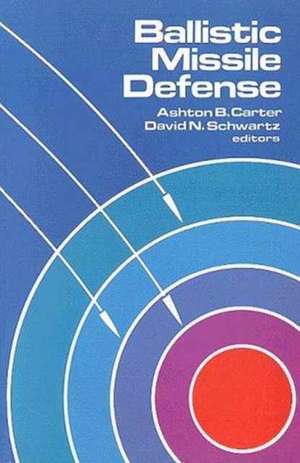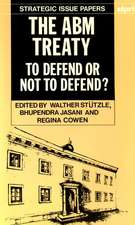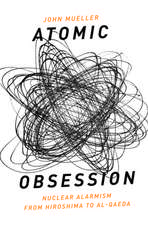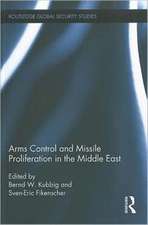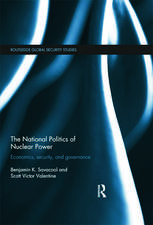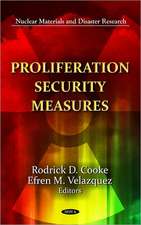Ballistic Missile Defense
Editat de Ashton B. Carter, David N. Schwartzen Limba Engleză Paperback – 1984
Defense against nuclear attack—so natural and seemingly so compelling a goal—has provoked debate for at least twenty years. Ballistic missle defense systems, formerly called antiballistic missile systems, offer the prospect of remedying both superpowers' alarming vulnerability to nuclear weapons by technological rather than political means. But whether ballistic missile defenses can be made to work and whether it is wise to build them remain controversial. The U.S.-Soviet Anti-Ballistic Missile Treaty of 1972 restricts testing and deployment of ballistic missile defenses but has not prohibited more than a decade of research and development on both sides. As exotic new proposals are put forward for space-based directed-energy systems, questions about the effectiveness and wisdom of missile defense have again become central to the national debate on defense policy.
This study, jointly sponsored by the Brookings Institution and the Massachusetts Institute of Technology, examines the strategic, technological, and political issues raised by ballistic missile defense. Eight contributors take an analytical approach to their areas of expertise, which include the relationship of missile defense to nuclear strategy, the nature and potential applications of current and future technologies, the views on missile defense in the Soviet Union and among the smaller nuclear powers, the meaning of the Anti-Ballistic Missile Treaty for today's technology, and the present role and historical legacy of ballistic missile defense in the context of East-West relations. The volume editors give a comprehensive introduction to this wide range of subjects and an assessment of future prospects. In the final chapter, nine knowledgeable observers offer their varied personal views on the ballistic missile defense question.
This study, jointly sponsored by the Brookings Institution and the Massachusetts Institute of Technology, examines the strategic, technological, and political issues raised by ballistic missile defense. Eight contributors take an analytical approach to their areas of expertise, which include the relationship of missile defense to nuclear strategy, the nature and potential applications of current and future technologies, the views on missile defense in the Soviet Union and among the smaller nuclear powers, the meaning of the Anti-Ballistic Missile Treaty for today's technology, and the present role and historical legacy of ballistic missile defense in the context of East-West relations. The volume editors give a comprehensive introduction to this wide range of subjects and an assessment of future prospects. In the final chapter, nine knowledgeable observers offer their varied personal views on the ballistic missile defense question.
Preț: 240.93 lei
Nou
Puncte Express: 361
Preț estimativ în valută:
46.10€ • 48.26$ • 38.15£
46.10€ • 48.26$ • 38.15£
Carte tipărită la comandă
Livrare economică 05-19 aprilie
Preluare comenzi: 021 569.72.76
Specificații
ISBN-13: 9780815713111
ISBN-10: 0815713118
Pagini: 446
Dimensiuni: 152 x 241 x 33 mm
Greutate: 0.64 kg
Editura: Brookings Institution Press
Colecția Brookings Institution Press
ISBN-10: 0815713118
Pagini: 446
Dimensiuni: 152 x 241 x 33 mm
Greutate: 0.64 kg
Editura: Brookings Institution Press
Colecția Brookings Institution Press
Notă biografică
Ashton B. Carter is a research fellow at the Center for International Studies at MIT. David N. Schwartz was a research associate in the Brookings Foreign Policy Studies program before his appointment as deputy director of the Office of Policy Analysis in the State Department's Burea of Politico-Military Affairs.
Descriere
Defense against nuclear attack—so natural and seemingly so compelling a goal—has provoked debate for at least twenty years. Ballistic missle defense systems, formerly called antiballistic missile systems, offer the prospect of remedying both superpowers' alarming vulnerability to nuclear weapons by technological rather than political means. But whether ballistic missile defenses can be made to work and whether it is wise to build them remain controversial. The U.S.-Soviet Anti-Ballistic Missile Treaty of 1972 restricts testing and deployment of ballistic missile defenses but has not prohibited more than a decade of research and development on both sides. As exotic new proposals are put forward for space-based directed-energy systems, questions about the effectiveness and wisdom of missile defense have again become central to the national debate on defense policy.
This study, jointly sponsored by the Brookings Institution and the Massachusetts Institute of Technology, examines the strategic, technological, and political issues raised by ballistic missile defense. Eight contributors take an analytical approach to their areas of expertise, which include the relationship of missile defense to nuclear strategy, the nature and potential applications of current and future technologies, the views on missile defense in the Soviet Union and among the smaller nuclear powers, the meaning of the Anti-Ballistic Missile Treaty for today's technology, and the present role and historical legacy of ballistic missile defense in the context of East-West relations. The volume editors give a comprehensive introduction to this wide range of subjects and an assessment of future prospects. In the final chapter, nine knowledgeable observers offer their varied personal views on the ballistic missile defense question.
This study, jointly sponsored by the Brookings Institution and the Massachusetts Institute of Technology, examines the strategic, technological, and political issues raised by ballistic missile defense. Eight contributors take an analytical approach to their areas of expertise, which include the relationship of missile defense to nuclear strategy, the nature and potential applications of current and future technologies, the views on missile defense in the Soviet Union and among the smaller nuclear powers, the meaning of the Anti-Ballistic Missile Treaty for today's technology, and the present role and historical legacy of ballistic missile defense in the context of East-West relations. The volume editors give a comprehensive introduction to this wide range of subjects and an assessment of future prospects. In the final chapter, nine knowledgeable observers offer their varied personal views on the ballistic missile defense question.
